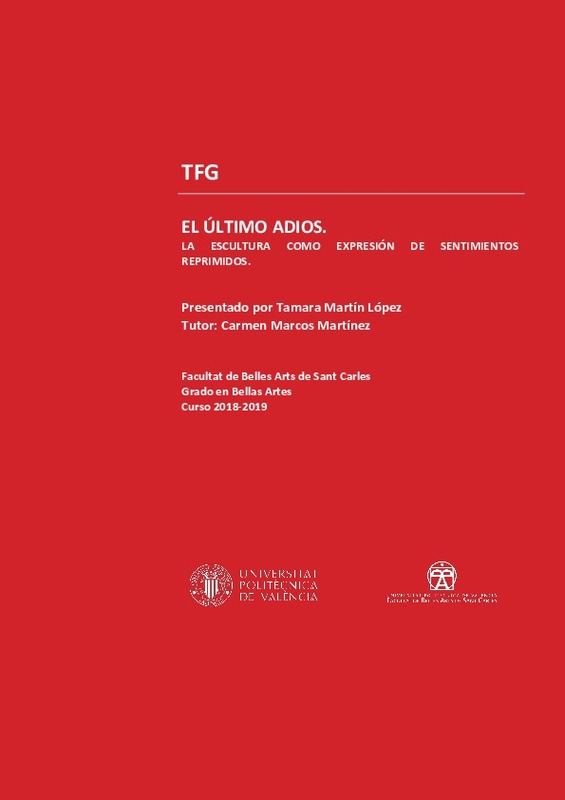JavaScript is disabled for your browser. Some features of this site may not work without it.
Buscar en RiuNet
Listar
Mi cuenta
Estadísticas
Ayuda RiuNet
Admin. UPV
El último adiós. La escultura como expresión de sentimientos reprimidos
Mostrar el registro sencillo del ítem
Ficheros en el ítem
| dc.contributor.advisor | Marcos Martínez, María del Carmen
|
es_ES |
| dc.contributor.author | Martin López, Tamara
|
es_ES |
| dc.date.accessioned | 2019-11-15T09:01:22Z | |
| dc.date.available | 2019-11-15T09:01:22Z | |
| dc.date.created | 2019-09-10 | es_ES |
| dc.date.issued | 2019-11-15 | es_ES |
| dc.identifier.uri | http://hdl.handle.net/10251/131106 | |
| dc.description.abstract | [ES] Este trabajo está formado por diversas piezas que aluden de una manera personal e introspectiva a los sentimientos principalmente negativos tras la muerte de un ser querido, tales como la rabia, la impotencia, el dolor, la soledad y la incertidumbre. La colección representa las diferentes fases por las que un individuo debe pasar hasta conseguir un estado de aceptación que en algunas ocasiones nunca llega; siendo la única solución continuar viviendo tratando de no recordar la ausencia de quien ya no está, algo que es prácticamente imposible. Cada elemento escultórico representa una batalla contra los demonios internos que encierran las emociones para que estas no puedan salir al exterior de manera que nadie puede percibirlas, pero tampoco pueden ser liberadas y pasan a formar parte de uno mismo. El proyecto presenta una experimentación con diferentes materiales que da lugar al aprendizaje y al conocimiento de las diferentes técnicas utilizadas. | es_ES |
| dc.description.abstract | [EN] This work is formed by diverse pieces that allude in a personal and introspective way to the mainly negative feelings after the death of a loved one, such as anger, impotence, pain, loneliness and uncertainty. The collection represents the different phases by which an individual must pass to get a state of acceptance that sometimes never comes; the only solution is to continue living trying not to remember the absence of someone who is no longer, something that is practically impossible. Each sculptural element represents a battle against the internal demons that enclose the emotions so that they cannot go outside so that no one can perceive them, but neither can they be released and become part of oneself. The project presents an experimentation with different materials that gives rise to the learning and knowledge of the different techniques used | en_EN |
| dc.language | Español | es_ES |
| dc.publisher | Universitat Politècnica de València | es_ES |
| dc.rights | Reserva de todos los derechos | es_ES |
| dc.subject | Escultura | es_ES |
| dc.subject | Muerte | es_ES |
| dc.subject | Materiales | es_ES |
| dc.subject | Sentimientos | es_ES |
| dc.subject | Superación. | es_ES |
| dc.subject | Sculpture | en_EN |
| dc.subject | Death | en_EN |
| dc.subject | Materials | en_EN |
| dc.subject | Feelings | en_EN |
| dc.subject | Overcoming. | en_EN |
| dc.subject.classification | ESCULTURA | es_ES |
| dc.subject.other | Grado en Bellas Artes-Grau en Belles Arts | es_ES |
| dc.title | El último adiós. La escultura como expresión de sentimientos reprimidos | es_ES |
| dc.type | Proyecto/Trabajo fin de carrera/grado | es_ES |
| dc.rights.accessRights | Abierto | es_ES |
| dc.contributor.affiliation | Universitat Politècnica de València. Departamento de Escultura - Departament d'Escultura | es_ES |
| dc.contributor.affiliation | Universitat Politècnica de València. Facultad de Bellas Artes - Facultat de Belles Arts | es_ES |
| dc.description.bibliographicCitation | Martin López, T. (2019). El último adiós. La escultura como expresión de sentimientos reprimidos. http://hdl.handle.net/10251/131106 | es_ES |
| dc.description.accrualMethod | TFGM | es_ES |
| dc.relation.pasarela | TFGM\100863 | es_ES |
Este ítem aparece en la(s) siguiente(s) colección(ones)
-
BBAA - Trabajos académicos [5086]
Facultad de Bellas Artes






